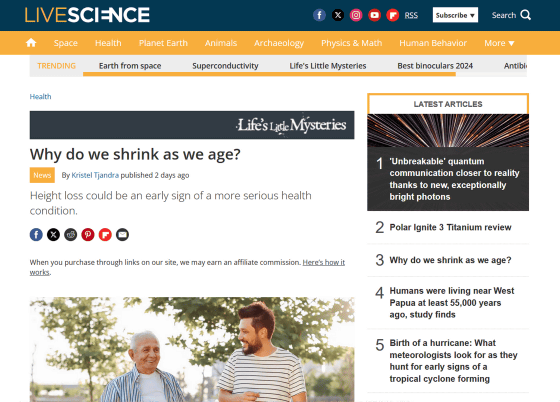Why do humans shrink as they age?

When you meet your elderly parents who live far away for the first time in a long time, you may have felt that they are shorter than before. This feeling is not just because you have grown bigger, but it is said that humans actually shrink as they get older. Live Science, a science media outlet, explained why humans shrink as they get older.
Why do we shrink as we age? | Live Science

Although the rate at which people age varies from person to person, the fact remains that as we get older, we tend to get shorter. This means that the elderly people walking around town have not always been as tall as they are now, but rather that they were taller when they were younger.
In fact, a study by the US National Institute on Aging , which followed 2,084 men and women aged 17 to 94 for 35 years, found that people start to lose height around the age of 30. The study found that between the ages of 30 and 70, men lost an average of 3cm and women lost an average of 5cm compared to their peak height. Furthermore, by the age of 80, men had lost an average of 5cm and women an average of 8cm.

Live Science explains that the reason why we shrink as we age is the result of a combination of the aging of three components that make up the body: bones, cartilage, and muscles. The main cause of shrinkage is bones.
Human bones begin to form around the eighth week of pregnancy and continue to grow until the mid-20s. The bone matrix that makes up bones is mainly made up of
When bones have to support more muscle mass, they become denser and stronger. As muscles grow, collagen fibers are produced, which lengthen and increase local blood flow, promoting bone growth. However, bone growth stagnates at around age 25-30, and at around age 40-50, old bone begins to break down faster than the body can create new bone, causing a gradual decrease in bone mass.
'Bone is like a matrix that connects everything together,' said Marianne Hannan , a professor at Harvard University who studies ageing. 'When you lose bone mass, the bridge-like structures in your bones weaken, and small loads on your bones can cause microfractures, which break down those tiny bone bridges.'
The accumulation of small bone damage leads to osteoporosis , which makes bones thin, brittle, and weak. Osteoporosis increases the risk of fractures of the spine, hips, arms, etc., which can lead to height loss. In fact, Hannan and his colleagues have seen cases where a patient who fractured seven or eight vertebrae that make up the spine lost 20 cm in height.

Another factor that can cause height loss is poor posture. If you have a hunched back or a sudden forward curvature of the spine, the upper part of your spine can become stiff and rounded, which can cost you several centimetres in height.
Hannan also points out that height can also decrease if
Muscles also play an important role in height loss with age. The loss of muscle mass in older people is called sarcopenia , and as it progresses, it increases the likelihood of weakening bone structure and bone loss.
Unlike osteoporosis, which can be treated with medicine, there is no magic bullet for sarcopenia. However, by engaging in appropriate exercise and strength training and eating a nutritious diet, even elderly people can maintain and improve muscle strength.

'We think of height loss as an early warning signal. If you notice that you're getting shorter, it's a good idea to talk to your doctor,' said Hannan.
Related Posts:
in Science, , Posted by log1h_ik







